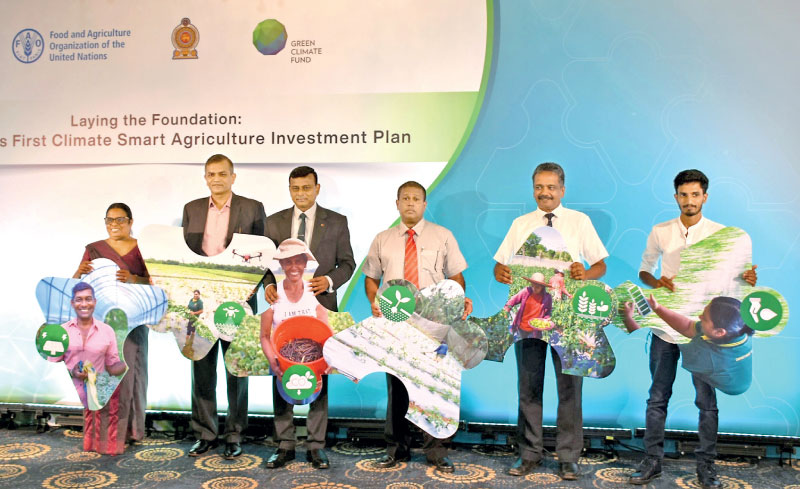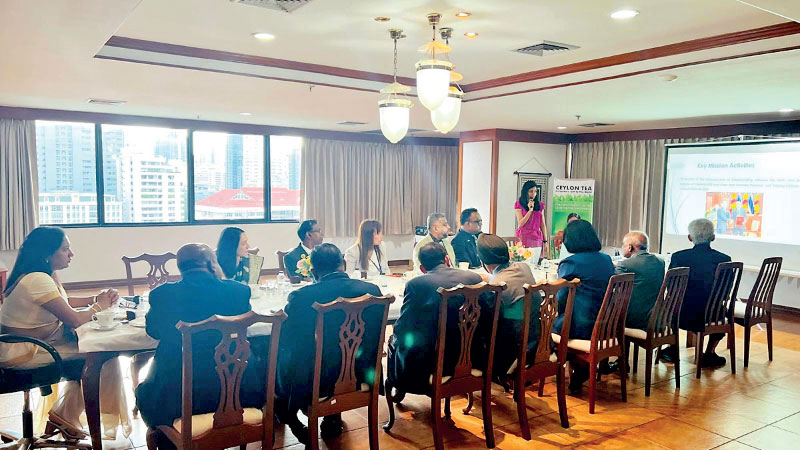Tuesday Feb 24, 2026
Tuesday Feb 24, 2026
Thursday, 29 August 2024 00:00 - - {{hitsCtrl.values.hits}}

Agriculture Ministry Additional Secretary Dr. Shiromani Edirimanna, FAO Representative for Sri Lanka Vimlendra Sharan, Environment Ministry Secretary Prabath Chandrakeerthi representing the National Designated Authority, Cargills Agro Solutions Managing Director Keerthi Kotagama, University of Peradeniya Faculty of Agriculture Prof. Buddhi Marambe, Potter Farm Organics and young agri-entrepreneur Dilan Leelawardena
Agriculture Ministry Additional Secretary Dr. Shiromani Edirimanna, FAO Representative for Sri Lanka Vimlendra Sharan, Environment Ministry Secretary Prabath Chandrakeerthi representing the National Designated Authority, Cargills Agro Solutions Managing Director Keerthi Kotagama, University of Peradeniya Faculty of Agriculture Prof. Buddhi Marambe, Potter Farm Organics and young agri-entrepreneur Dilan Leelawardena
|
Environment Ministry Secretary Prabath Chandrakeerthi
|
In a bid to combat the escalating challenges posed by climate change, Sri Lanka has commenced the formulation of its first Climate-Smart Agriculture (CSA) Investment Plan.
This landmark initiative, funded by the Green Climate Fund (GCF) and implemented by the Food and Agriculture Organisation of the United Nations (FAO) in partnership with the Environment Ministry and Agriculture Ministry, aims to develop a comprehensive strategy to safeguard the country’s agricultural sector from the adverse impacts of climate change.
Sri Lanka, with its tropical climate, is highly susceptible to the effects of climate change, consistently ranking among the top ten countries at risk of extreme weather events according to the Global Climate Risk Index. Projections indicate significant shifts in weather patterns, including rising temperatures, erratic rainfall, and increased frequency of extreme events, all of which have already begun to diminish agricultural productivity and water availability across the island.
Agriculture in the dry and intermediate zones is particularly vulnerable to the changing and variable climate due to climate change, with research projecting an average 10-12% yield reduction if appropriate interventions are not implemented to mitigate these effects. The CSA Investment Plan is designed to be a strategic and comprehensive blueprint for fostering agricultural development that is resilient to climate change. Through this plan, FAO specialists, including both international and national experts, will work closely with a wide range of stakeholders—including Government bodies, the private sector, and academia—to assess national climate finance priorities and develop innovative investment mechanisms tailored to the unique challenges faced by Sri Lanka’s agricultural sector.
Environment Ministry Secretary and National Designated Authority representative Prabath Chandrakeerthi, highlighted the significance of this initiative: “Sri Lanka’s vulnerability to climate change is a pressing concern, particularly for our farmers who are at the frontline of this crisis. The development of a Climate-Smart Agriculture Investment Plan is a timely and necessary step to equip our agricultural sector with the tools and resources needed to adapt and thrive in a changing climate. We are committed to working collaboratively with all stakeholders to ensure the success of this initiative.”
This investment plan will bridge the gap between farmers and investors, attract private sector investment for climate-smart interventions, and open new avenues for youth and young entrepreneurs. FAO Representative for Sri Lanka Vimlendra Sharan emphasised the importance of this initiative: “Climate change is not a distant threat — it is a present reality that is already affecting our farmers and our food security. The Climate-Smart Agriculture Investment Plan will be a vital tool in ensuring that Sri Lanka’s agricultural sector can adapt to these changes and continue to thrive in the face of adversity.”
This workshop marks the first of several consultations planned as part of the CSA Investment Plan’s development process, reflecting FAO’s commitment to an inclusive, participatory approach that brings together all relevant voices in the fight against climate change.
'
